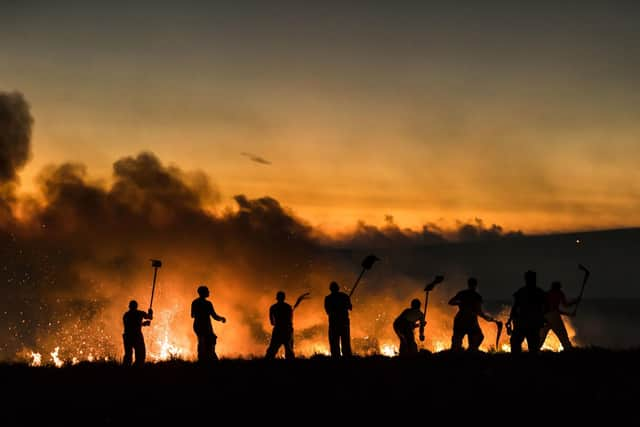Weather extremes from wildfires to drought set to worsen without action warns National Trust
Yorkshire was hit with wildfires this summer as temperatures topped record levels, while reservoirs ran almost dry and with drought orders imposed.
Now, in its annual review, the conservation charity has said this year's weather extremes are set to become the "new normal" nationwide or even worsen as temperatures rise.
Advertisement
Hide AdAdvertisement
Hide AdHabitats were scorched by wildfire while natterjack toads, butterflies, birds and bats were hit by drought, the National Trust has outlined in its nature review.


The impact is a "stark illustration" of the difficulties many of the UK's species could face, it warns, without more action to tackle climate change and help nature cope.
Keith Jones, climate change adviser at the National Trust, said: "There is no escaping that this year's weather has been challenging for nature. Drought, high temperatures, back-to-back storms, unseasonal heat, the recent cold snap and floods means nature, like us, is having to cope with a new litany of weather extremes.
"It is a stark illustration of the sort of difficulties many of our species will face if we don't do more to mitigate rising temperatures and helping nature's survival."
Advertisement
Hide AdAdvertisement
Hide AdWeather experts predict that 2022 will set a "benchmark" for what a typical year will see, he added, but the "new normal" is also likely to result in even more weather extremes.
The country saw a warm start to the year followed by back-to-back storms wreaking havoc with road closures and felled trees, and with the National Trust’s centuries-old water gardens at Fountains Abbey and Studley Royal suffering extensive damage under Storm Franklin.
Then a dry spring, with a heatwave summer as temperatures topped 40C. A drought was officially declared in Yorkshire in August as reservoir levels dipped, while a succession of wildfires broke out across the region.
This year was also devastating for wild birds hit by avian flu, the National Trust has said, with thousands of seabirds dying in colonies.
Advertisement
Hide AdAdvertisement
Hide AdWhile there were some "winners", including good apple crops on many National Trust estates, and a record-breaking year for choughs breeding in Cornwall, there were also many losers from the turbulent seasons, the charity said. Trees planted last winter were hit by the drought and extreme heat, with half of all saplings lost on some National Trust estates such as in Cambridgeshire.
The National Trust outlined conservation work to make habitats more resilient, with beavers introduced in Somerset building a wet woodland habitat, and efforts to restore peatland.
But Ben McCarthy, head of nature conservation and restoration ecology, said: "Our wildlife is under extraordinary pressure from a number of sources such as habitat loss and pollution. Now we've got this topsy-turvy weather coming in as climate change bites, which impacts the predictable seasonal patterns and adds further pressure on our wildlife."